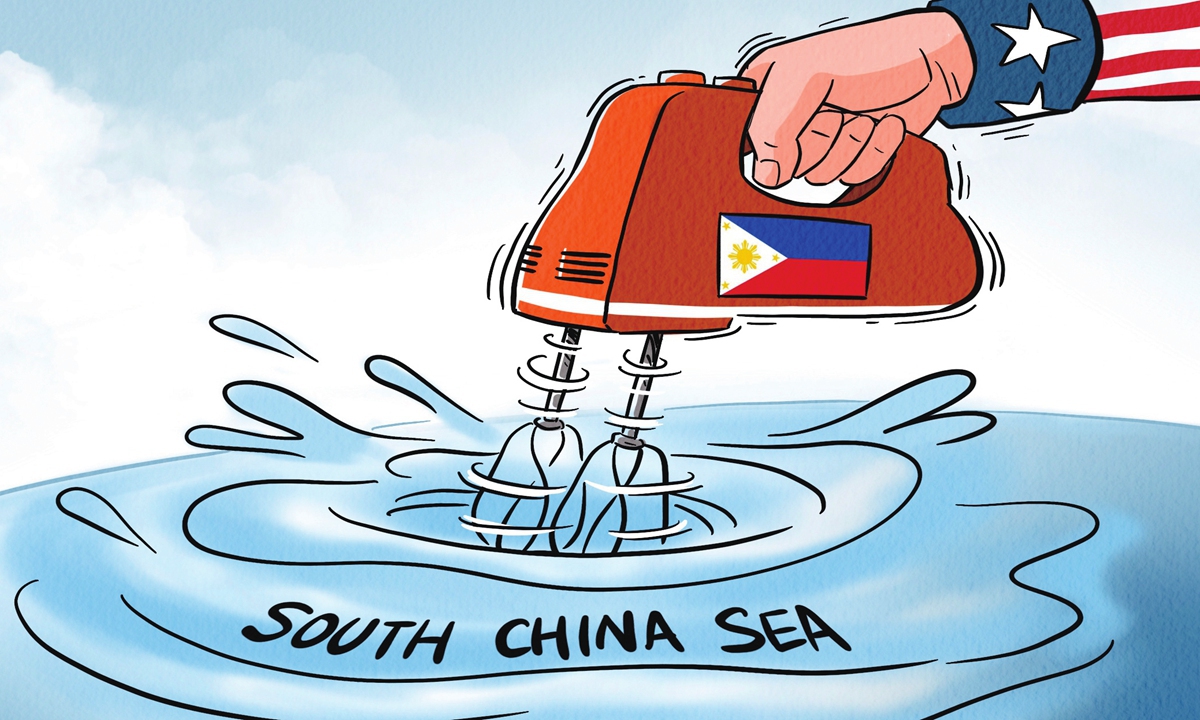
Illustration: Liu Rui/GT
In the past several days, clashes between some Chinese and Philippine vessels in the South China Sea have garnered a lot of attention. The Philippine vessels entered the area close to Ren'ai Jiao, over which China claimed sovereignty, to deliver "supplies" to the stranded BRP Sierra Madre. They were later driven away by the Chinese Coast Guard vessels. A large portion of these "supplies" consisted of building materials intended to reinforce the boat which was said to be on the verge of disintegration. The Philippines authorities headed by President Marcos Jr. have been very vocal in blaming China for this confrontation. They even have gained support from some other countries to advocate for the security and so-called sovereign rights of the Philippines.
However, is the Philippines really the "bullied" party? And what is the true story behind the BRP Sierra Madre?
On May 9, 1999, the military vessel BRP Sierra Madre illegally intruded into China's Ren'ai Jiao, or what the Filipinos call as the Second Thomas Shoal, running aground due to purported "technical difficulties." Recognizing that the sovereignty of Ren'ai Jiao undeniably belongs to China and the vessel's intrusion was purely a mistake, the Philippine government committed to towing the ship away but never fulfilled this commitment. The naval vessel was later used as an outpost to consolidate the Philippines' actual control of Ren'ai Jiao.
During all these years, China has shown patience and restraints, engaging in negotiations with the Philippines to settle the lingering issue of BRP Sierra Madre. Bilateral agreements were signed aiming at a peaceful solution, excluding any third-party involvement or interference. Out of humanitarian consideration, China also allowed the crew members on the boat to receive fresh water and food until the promised day of towing away the vessel. If it weren't for China's goodwill, the crew members might have already fled away from the boat due to its harsh conditions and BRP Sierra Madre might have already sunk into the abyss of the sea.
But China's kindness and forbearance have not always been appreciated. During the time when Aquino III was president, the Philippine side made an insatiable move: It filed a "territorial dispute" to the International Tribunal for the Law of the Sea, claiming that Ren'ai Jiao was within the Exclusive Economic Zone of the Philippines.
After a relatively peaceful time during Duterte's term in office, things took a turn for the worse from early this year after President Marcos Jr. took office. The tensions in the South China Sea resurfaced. The situation deteriorated because the BRP Sierra Madre was about to crumble due to its poor condition and the Philippines will have nothing to claim "actual control."
Also, and more importantly, the Marcos Jr. authorities chose to align with the US and rely on their defense alliances to provoke China in the South China Sea. The president believes that the US, a "close ally," is standing by, and offering him security and confidence to provoke China.
But, does the US really take the Philippines as a "little brother" that it needs to take care of, or only a pawn that could serve the US' interests in its rivalry with China?
Just as Gina Apostol, a renowned Philippine writer commented once: "Filipinos find themselves not only with another President Marcos but also with another creeping occupation by the US military under the guise of East Asian security. "
A peaceful and placid South China Sea is in the best interests of the countries in the region. However, this is the last thing on the US' mind. The South China Sea has witnessed hundreds of years of peace and stability before the US sent its navy here. Countries at the rim of the sea have already worked out many ways to solve their frictions during years of contacts and interactions because all of them know that regional stability is the key to their development and peace is what they must cherish. This is why disputes between countries in the region often find amicable solutions, as seen in the case of Vietnam and China managing their disagreements over maritime dispute.
President Marcos Jr. needs to wake up from the illusion that the US will provide everything the Philippines asks for. Judging by what the US has often done to its allies and partners, it is more likely that the US, as a warmonger, will only back-stab rather than back-up.
The author is a commentator on international affairs, writing regularly for Xinhua News, Global Times, China Daily, CGTN etc. He can be reached at Xinping604@gmail.com.




